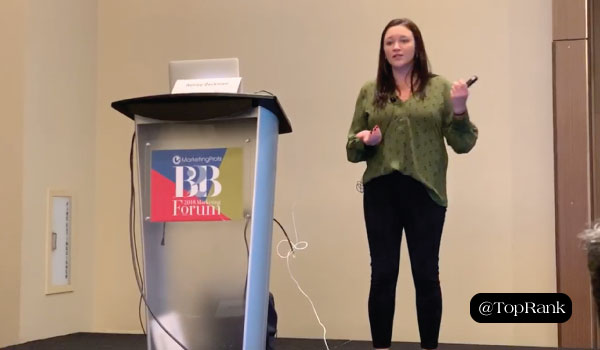
Influencer marketing is a phrase on the tip of most marketer’s tongues, but many are still struggling to figure out exactly what it means in the context of their B2B business and how to implement.
At last week’s MarketingProfs B2B Forum in San Francisco, TopRank Marketing’s Ashley Zeckman took the stage to help set the influencer marketing story straight and provide insights into what it REALLY takes to develop a successful B2B influencer marketing program.
Why the Sudden Need for Influencer Marketing?
Trust in marketers has fallen. In fact, a recent study by HubSpot found that only 3% of people trust marketers (just over lobbyists and politicians). And B2B marketers specifically are facing the worst of it. MarketingProfs and CMI’s most recent report found that only 51% of B2B marketers state that their marketing is moderately successful and 61% of them still don’t have a document content strategy.
Unfortunately, many B2B marketers are still developing personas and creating content for the wrong audience. B2B buyers are just as human as B2C consumers which means it’s ESSENTIAL to partner with experts that they know and trust.
Entering the Era of Influencer Marketing
Collaborating with influencers presents an opportunity for brands to begin rebuilding trust by partnering with influential experts that their audience knows and trusts. In this post, we’ll explore three key considerations for successful influencer marketing.
3 Considerations for Better B2B Influencer Marketing
Identifying Influencer Types and Characteristics
According to Ashley, there are 5 main influencer types (each with different characteristics) that B2B brands should consider when developing a content-driven influencer program. Below we’ve included insights into the benefits of working with each influencer type:
- Brandividual: Recognizable and increases your reach. Great for bringing in new audiences.
- Up & Comer: Quickly gaining momentum and notoriety within their industry. Very motivated to collaborate and share.
- Niche Expert: Very deep expertise on specific topics that resonate with your audience.
- Internal Expert: Great for building thought leadership and trust for specific members of your brand.
- Customers: Fits ideal customer profiles and helps your target customers see themselves in the content.
Opportunities for Influencer Engagement
Working with influencers no longer just means paying them to peddle products. Instead, there are limitless opportunities to collaborate with influencers in a meaningful way where both the influencer and the brand see the value. Here are a few options for how you can work with influencers:
Stage 1:
- Gifting products
- Publishing sponsored content
- Obtaining product reviews
- Participation in contests and giveaways
Stage 2:
- List posts mentioning your influencers
- Collaboration on text-based static content
- Obtaining influencer quotes
- Interviews
Stage 3:
- Full campaign collaboration
- Audio or video interviews
- Interactive content
Stage 4:
- Serialized content (including podcasts or videos)
- Organized VIP influencer programs
- Ongoing engagement (both paid and organic)
Creating a Great Influencer Experience
One of the most important and often-overlooked pieces of influencer marketing is to create a great influencer experience.
Many marketers, unfortunately, work hard to obtain influencer content, and then treat the influencer like a commodity.
Instead, we have an opportunity to be thoughtful about each and every interaction we have with an influencer. That means, creating personalized outreach that speaks to the needs of the individual and identifying opportunities to make the influencer feel valued.
Top Questions to Ask
If you’re just beginning to explore influencer marketing or have been trying to move it forward within your organization for a while, there are a few key questions to ask yourself:
- What would it take to turn your content hurdles into influencer opportunities?
- What is the potential impact that you could have?
- What is the cost if you do (people, tools, resources)?
- What is the cost if you don’t?

Comments are Closed